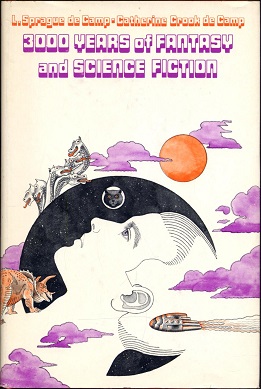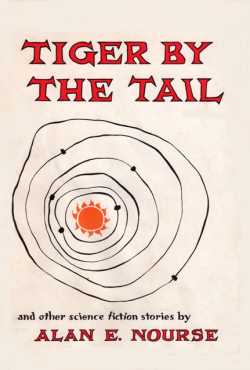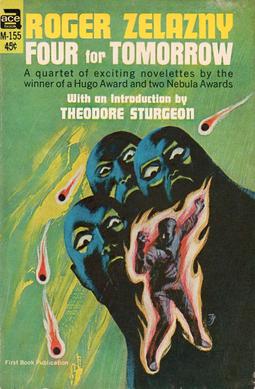
Scientific romance is an archaic, mainly British term for the genre of fiction now commonly known as science fiction. The term originated in the 1850s to describe both fiction and elements of scientific writing, but it has since come to refer to the science fiction of the late nineteenth and early twentieth centuries, primarily that of Jules Verne, H. G. Wells and Arthur Conan Doyle. In recent years the term has come to be applied to science fiction written in a deliberately anachronistic style as a homage to or pastiche of the original scientific romances.

Sam Moskowitz was an American writer, critic, and historian of science fiction.
Roger Elwood was an American science fiction author and editor, who edited a large number of anthologies and collections for a variety of publishers during the early to mid-1970s.
The Dreams Our Stuff Is Made Of: How Science Fiction Conquered the World is an overview of the interactions between science fiction and the real world, written by Thomas M. Disch, an American author in the field. It is neither a history of science fiction nor a collection of personal anecdotes, but contains some of each, and is written in somewhat conversational style, designed to appeal to both a relative newcomer to science fiction and an expert in the field.

James Henry Schmitz was an American science fiction writer born in Hamburg, Germany of American parents.

The literary genre of science fiction is diverse, and its exact definition remains a contested question among both scholars and devotees. This lack of consensus is reflected in debates about the genre's history, particularly over determining its exact origins. There are two broad camps of thought, one that identifies the genre's roots in early fantastical works such as the Sumerian Epic of Gilgamesh. A second approach argues that science fiction only became possible sometime between the 17th and early 19th centuries, following the scientific revolution and major discoveries in astronomy, physics, and mathematics.

Tales from Gavagan's Bar is a collection of fantasy short stories by American writers L. Sprague de Camp and Fletcher Pratt, illustrated by the latter's wife Inga Pratt. It was first published in hardcover by Twayne Publishers in 1953; an expanded edition rearranging the contents and adding pieces not in the first was published in hardcover by Owlswick Press in June 1978. The original illustrations were retained in this edition. It was subsequently issued in paperback by Bantam Books in January 1980. An e-book edition was published by Gollancz's SF Gateway imprint on September 29, 2011 as part of a general release of de Camp's works in electronic form. The collection has also been published in German.

3000 Years of Fantasy and Science Fiction is an anthology of fantasy and science fiction short stories, edited by American writers L. Sprague de Camp and Catherine Crook de Camp. It was first published in both hardcover and paperback by Lothrop Lee & Shepard in 1972. It was the first such anthology assembled by the de Camps, preceding their later Tales Beyond Time (1973).

Gertrude Barrows Bennett, known by the pseudonym Francis Stevens, was a pioneering American author of fantasy and science fiction. Bennett wrote a number of fantasies between 1917 and 1923 and has been called "the woman who invented dark fantasy".
The Road to Science Fiction is a series of science fiction anthologies edited by American science fiction author, scholar and editor James Gunn. Composed as a textbook set to teach the evolution of science fiction literature, the series is now available as mass market publications. The six-volume set collects many of the most influential works of the genre. It was published originally by Signet and then by White Wolf Games Studio. Volumes 1 through 4 are currently being reprinted in paperback format by the company Scarecrow Press.

In Search of Wonder: Essays on Modern Science Fiction is a collection of critical essays by American writer Damon Knight. Most of the material in the original version of the book was originally published between 1952 and 1955 in various science fiction magazines including Infinity Science Fiction, Original SF Stories, and Future SF. The essays were highly influential, and contributed to Knight's stature as the foremost critic of science fiction of his generation. The book also constitutes an informal record of the "Boom Years" of science fiction from 1950 to 1955.
French science fiction is a substantial genre of French literature. It remains an active and productive genre which has evolved in conjunction with anglophone science fiction and other French and international literature.

Tiger by the Tail and Other Science Fiction Stories is the first collection of short works by Alan E. Nourse, issued in hardcover by publisher Donald McKay in 1961. It was reprinted in paperback by MacFadden Books in 1964 and 1968. A British hardcover edition was published by Dennis Dobson in 1962, with a paperback reprint, retitled Beyond Infinity, following from Corgi Books in 1964.

Seekers of Tomorrow: Masters of Modern Science Fiction is a work of collective biography on the formative authors of the science fiction genre by Sam Moskowitz, first published in hardcover by the World Publishing Company in 1965. The first paperback edition was issued by Ballantine Books in October, 1967. A photographic reprint of the original edition was issued in both hardcover and trade paperback by Hyperion Press in 1974. Most of its chapters are revised versions of articles that initially appeared in the magazine Amazing Stories from 1961 to 1964.

Modern Masterpieces of Science Fiction is an anthology of science fiction short stories, edited by Sam Moskowitz. It was first published in hardcover by World Publishing Co. in 1965, and reprinted by Hyperion Press in 1974. It was split into three separate paperback anthologies published by MacFadden-Bartell; Doorway Into Time (1966), The Vortex Blasters (1968) and Microcosmic God (1968); the paperback editions omitted Moskowitz's introduction and the story by Robert Bloch.

Masterpieces of Science Fiction is an anthology of science fiction short stories, edited by Sam Moskowitz. It was first published in hardcover by World Publishing Co. in 1966, and reprinted by Hyperion Press in 1974.

Four for Tomorrow is the first story collection by Roger Zelazny, published in paperback by Ace Books in 1967. British hardcover and paperback editions followed in 1969, under the title A Rose for Ecclesiastes. The first American hardcover was issued in the Garland Library of Science Fiction in 1975. A French translation appeared in 1980. Paperback reissues continued from Ace and later from Baen Books into the 1990s.

The Best of Lester del Rey is a collection of science fiction short stories by American author Lester del Rey. It was first published in paperback by Del Rey/Ballantine in September 1978 as a volume in its Classic Library of Science Fiction, with a Science Fiction Book Club hardcover edition following in December of the same year. It was reprinted by Del Rey Books in March 1986, February 1995, and June 2000. The book has been translated into German.

The Best of Cordwainer Smith is a collection of science fiction short stories by American author Cordwainer Smith, edited by J. J. Pierce. It was first published in hardback by Nelson Doubleday in July 1975 and in paperback by Ballantine Books in September of the same year as a volume in its Classic Library of Science Fiction. The Ballantine edition was reprinted in October 1977 and July 1985. Phoenix Pick issued a new edition in trade paperback and ebook in April, 2017. A British paperback edition under the alternative title The Rediscovery of Man was published by Gollancz in June 1988, and reissued in 1999, 2003, and 2010; Gollancz also brought out hardcover and ebook versions in September 1988 and November 2012, respectively. The book has also been translated into German.

A Plunge into Space is an 1890 science fiction novel by Irish author Robert Cromie. It describes a voyage to Mars, where Earthlings find a utopia that is so perfect as to be boring. It received mostly positive reviews upon release and likely sold well. The second edition was published in 1891 with a preface attributed to the French science fiction author Jules Verne; modern scholars have concluded that it was likely written by somebody else. Cromie later accused fellow writer H. G. Wells of plagiarising key plot elements from the book for his 1900–1901 serial The First Men in the Moon; Wells denied ever having heard of Cromie or the book.
















